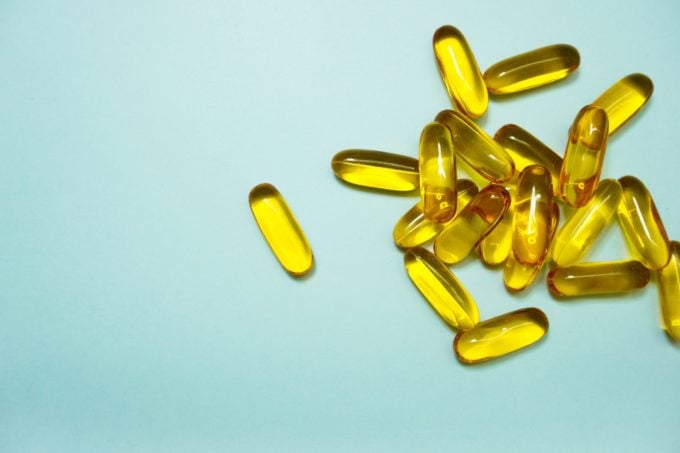A Dietitian’s Guide to Supplements for Celiac Disease

When you have a chronic autoimmune disease like celiac disease, you want to do everything you can to support healing…but does that mean taking supplements? Read on for a dietitian’s take on common nutrient deficiencies in celiac disease and whether or not supplements like probiotics or vitamin D can help support optimal health.
Celiac disease is unique in that it’s the only autoimmune disease exclusively managed by diet. As a gut health dietitian, I’ve been working with folks who have celiac disease for over a decade and I get a lot of questions about the role of supplements in celiac disease.
It’s one of the reasons why most of the recipes on this website are gluten free, as well as 100% of the recipes in my Eat More Plants Cookbook and many in my Good For Your Gut book . So I’ll touch on some common nutrient deficiencies in celiac disease, how to navigate gluten in common supplements, as well as supplements that might be helpful for people with celiac disease.
If you’re newly diagnosed with celiac disease, I have a post on everything you need to know about gluten and celiac disease and have written extensively about gut health nutrition. So if you’re inclined, take in the celiac post first, and then we’ll dive in back here after …
This post covers all the below topics:
Nutrient Deficiencies in Celiac Disease
Iron deficiency and Anemia in Celiac Disease
Gluten in Vitamins and Supplements
Top 5 Supplements for Celiac Disease
Got irritable bowel syndrome? I’ve covered supplements for IBS in another post!
Nutrient Deficiencies in Celiac Disease
Because the autoimmune process in celiac disease impacts the absorptive surface of the small intestine, nutrient deficiencies are pretty common at diagnosis, depending on the level of gut damage present. The most common deficiencies are:
- Iron
- Zinc
- Folate
- Vitamin B12
- Vitamin D
Calcium, vitamin B6, and magnesium deficiencies are also common. In some cases, adopting the gluten free diet allows the gut to heal and deficiencies resolve.
In that case, we will simply focus on getting nutrient-dense foods such as naturally gluten free beans and whole grains to supply adequate nutrition. It’s worth noting that relying on a lot of hyper-processed gluten free foods is also associated with deficiencies, particularly folate because so many of these foods are made from lower nutrient flours like white rice and may not be fortified.
However, in other cases, we may need to supplement. For example, vitamin D is scarce in the food supply and supplementation is recommended for everyone, including those with celiac disease.
It’s worth noting that many gluten free foods are also much lower in fiber – between that and the inflammation in the gut, it can be hard getting enough fibre in. If that is the case, psyllium fiber may be helpful in increasing your fibre intake in a gentle way until your gut has healed enough to tolerate more high fibre foods.
Iron deficiency and Anemia in Celiac Disease
Iron deficiency anemia is very common in celiac disease and may in fact be the presenting symptom that brings you to the doctor’s office, where you wind up with a diagnosis of celiac disease. Low iron can occur both from the intestinal damage due to the disease but also due to lower iron intake from refined gluten free flour products. People with celiac disease may also have ‘anemia of chronic disease’, which is not associated with low iron intake but other inflammatory-related disease processes and requires medical care.
Gluten in Vitamins and Supplements
Gluten may be present in medications, as well as vitamin and mineral supplements, particularly as a filler ingredient (starch). Ensure that you carefully read packaging and websites to inspect ingredients and look for any allergen warnings regarding gluten.
It seems to be way more common for supplements to be gluten free these days, but always important to double check just to be safe.
Top 5 Supplements for Celiac Disease
As a dietitian, my goal is ALWAYS to provide the nutrients you need through food FIRST. I would prefer to see you spending your hard-earned cash on healthy whole foods whenever possible. So when supporting someone with celiac disease, we aim to introduce foods that fill those voids, such as focusing on calcium or magnesium rich foods.
However, sometimes, you need a little extra support, either because your doctor recommends supplementation or you aren’t sure if you can consistently get what you need through your diet. Sometimes, I might recommend a basic liquid multivitamin as it will cover a lot of bases, such as a folate, zinc, and a small amount of iron. Liquid formulations are helpful as they will be easier for a fragile gut to digest and absorb. It’s also really important to consume your vitamin and mineral supplements with a meal as the digestive machinery of the body is ‘primed’ for absorption when you eat.
- Vitamin D: Every human needs vitamin D from birth, and it’s scarce in our food supply, so this is the one vitamin that I recommend for everyone. If your doctor can test your levels, they can customize an effective dose for you but in the absence of that, 1000IU of vitamin D3 in the brightest 6 months of the year and 2000IU of vitamin D3 in the darkest 6 months of the year (Oct – Mar here in Canada) is a safe dose for life.
- Iron: If you don’t feel like you eat enough iron-rich foods, you could take a basic multivitamin containing iron to help top you up. However, DO NOT take a single iron supplement unless under the express guidance of your doctor. Because the body only clears iron in blood loss such as menstruation, taking too much iron is dangerous.
- Magnesium: Magnesium is found in greens, beans, whole grains as well as cocoa. Women (AFAB) need 310-320 mg daily and men (AMAB) need 400-420 mg daily. This is very possible with food but I also find that some folks do really well with an additional supplement. I recommend a form of magnesium called glycinate (or bisglycinate) as it is less likely to cause GI upset. If you’re on any medications, such as blood pressure medication or osteoporosis medication (there are more!), check with your doctor or pharmacist before taking magnesium. Otherwise, magnesium is generally safe and well tolerated.
- Folate: Folate is another vitamin that is easy to obtain from a simple multivitamin and you may wish to go this route as you are healing your gut. Greens, legumes, and fortified whole grain foods are common plant sources of folate. However, gluten free grain products may not be fortified. Too much folate is also not a good thing so if you choose to supplement with folate, keep it to the recommended 400 micrograms for adults (600 micrograms in pregnancy) unless instructed otherwise by your doc.
- Zinc: Zinc is a nutrient I recommend that you get from careful attention to diet as opposed to single supplements. Adults need 8 mg zinc (women/AFAB) or 11 mg zinc (men/AMAB) daily. If you’re on a plant-based diet, choose nuts, seeds and legumes as your primary source of zinc so eat these foods daily. A basic multivitamin will also contain a small amount of zinc.
Probiotics for Celiac Disease
The gut microbiome has been implicated as a potential contributing factor to celiac disease, and the inflammation of celiac disease can also impact the gut microbiome, so many people wonder if taking a probiotic is a good idea. While it makes sense in theory, there isn’t much human trial research on probiotics in celiac disease and we don’t yet have probiotics on the market that have been specifically tested for efficacy in celiac disease.
If you are curious—particularly if you also have a significant amount of IBS-like symptoms like gas, bloating or diarrhea—it won’t hurt to try a probiotic for 12 weeks (if it easily fits your budget because they’re pricey!). Be sure to choose your probiotic carefully as the vast majority of products on the market are NOT evidence-based.
Gluten Digestive Enzymes
Digestive enzymes are a common purchase at the health food store, despite having very little evidence to support their use. Of particular concern to me are the ‘glutenase’ digestive enzymes because they might give you the impression that taking them means eating gluten won’t hurt you, which is 100% untrue. There are currently ongoing trials for pharmaceutical enzymes for celiac disease…but those aren’t on the market yet.
Anecdotally, clients have told me that they find digestive enzymes help relieve abdominal discomfort. So, while I don’t typically recommend them, if you find that digestive enzymes help your stomach feel more settled after an accidental gluten ingestion, I suppose they won’t hurt every once in a while. Again, as long as you aren’t putting strain on your grocery budget to buy them!




10 Comments on “A Dietitian’s Guide to Supplements for Celiac Disease”
Thank love all your suggestions And recipes
Thank you so much Bea!
Hi! I’m Interested in what brand liquid multivitamin you recommend.
Thanks!!
It really depends on your individual needs! But Now, Mary Ruth and Centrum are all reputable brands.
Hi, celiac has caused dangerously low weight for me (5’9 at 45 kg), And my fat and protein digestion seems highly inefficient,
I wanna know if digestive enzymes and protein supplements (with fat diet) would be beneficial even if I get minutely contaminated with gluten (less than 10mg a day), because it’s hard to stay gluten free in a developing country like India. I do not intake gluten substances but gluten associated substances are heavily present around me (sometimes in powder form, sometimes in essential packets that say “traces of gluten”) due to being cheap commodity.
Thanks in advance.
Hi Eshan,
I am sorry to hear that you are having these difficulties. Digestive enzymes are definitely not going to compensate for gluten contamination so I would recommend, if you can, to get some 1:1 care from a dietitian in India who knows the food supply so she can give you really good, specific advice to help improve things for you. Wishing you all the best! Desiree
My Dr has recommended a 150mg daily dose of elemental iron due to anemia caused by IBD. After several months my Fe continues to be low (~15). I am wondering if there is a better quality iron supplement to look for that may have a higher absoprtion rate? Thanks
Hi Shauna,
Might be worth talking to an RD/your doc as there could be multiple reasons why your iron isn’t increasing, including anemia of inflammation, so a different supplement might not help…it may be more important to adjust meds + diet to get inflammation down. However, some people do respond differently to different iron options. For example, both FeraMAX and liquid iron like Floradix are trusted options.
Thank you for this wonderful article.
I am so glad it was helpful Joseph!